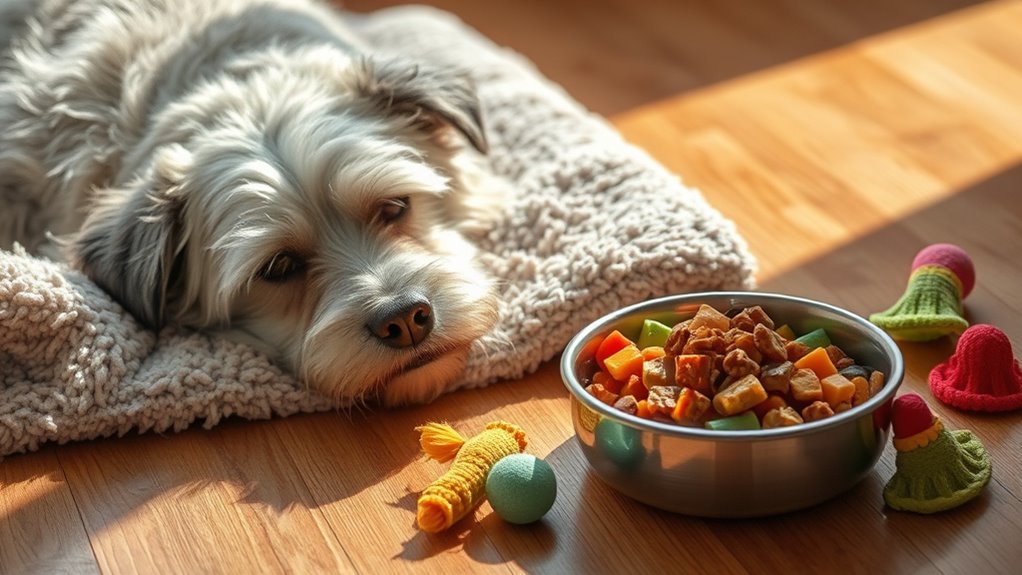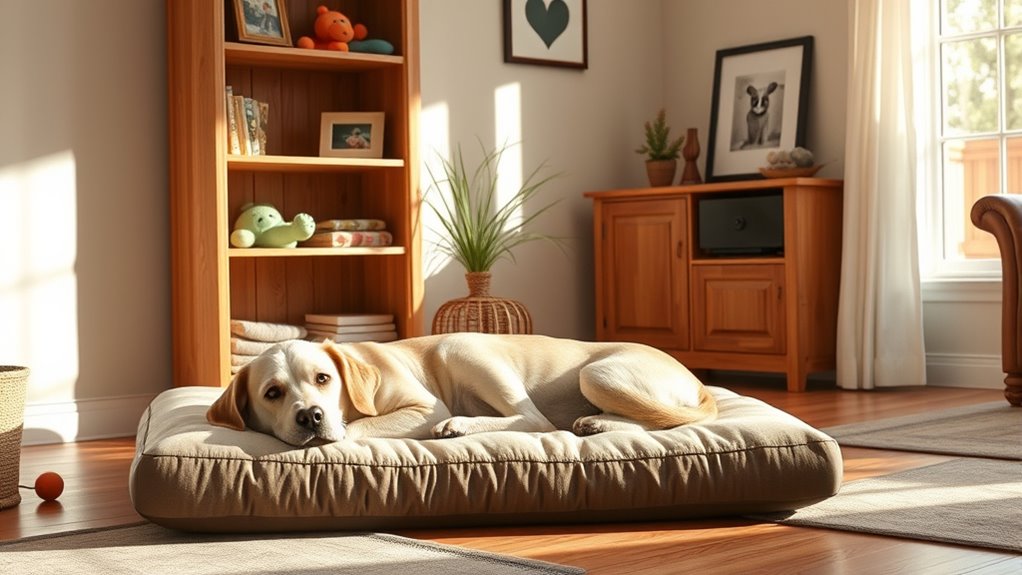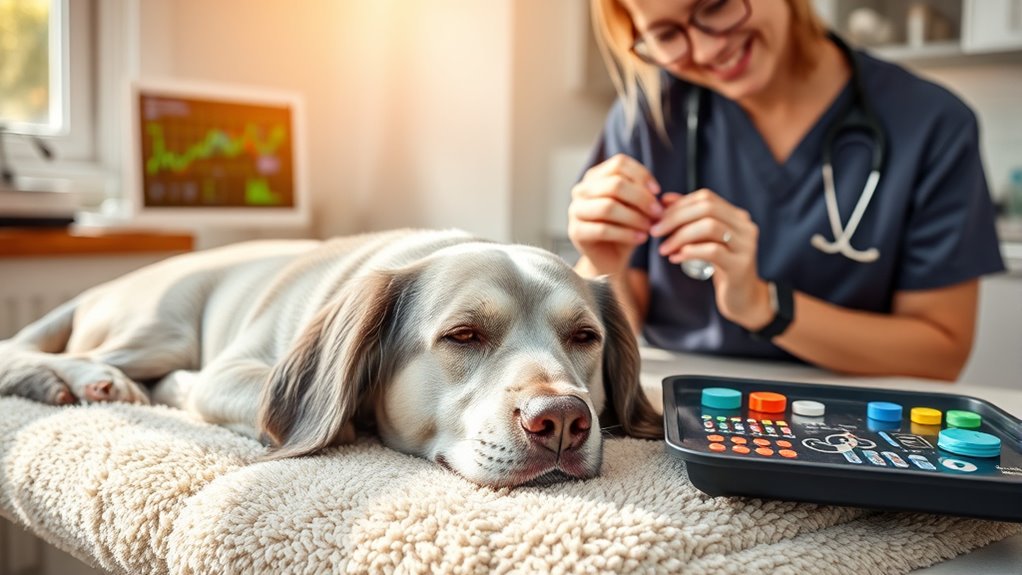To extend your senior pet’s quality of life after age 10, focus on recognizing health changes early, providing tailored nutrition with joint and brain support, and creating a safe, comfortable environment. Regular vet visits help catch issues like arthritis or dental problems early. Keep them mentally engaged with stimulating activities, ensure a cozy space, and maintain routine health checks. Caring thoughtfully now can make a meaningful difference — continue to learn how to give your pet the best life possible.
Key Takeaways
- Regular veterinary checkups and early detection of health issues improve longevity and quality of life.
- Tailoring diet with senior-specific nutrition and supplements supports joint, dental, and cognitive health.
- Creating a safe, comfortable environment minimizes hazards and promotes physical safety.
- Providing mental stimulation and enriching activities maintains cognitive function and emotional well-being.
- Addressing age-related mobility and dental concerns promptly enhances comfort and overall health.
Recognizing and Addressing Age-Related Health Changes

How can you tell if your senior pet is experiencing age-related health changes? Keep an eye on their joint health; stiffness, limping, or difficulty getting up can signal arthritis. Changes in activity levels or reluctance to jump or climb stairs are common signs. Dental care also plays a crucial role—bad breath, drooling, or difficulty eating may indicate dental issues that affect overall health. Watch for behavioral shifts, like increased irritability or withdrawal, which can reflect discomfort or pain. Regular vet checkups help detect these issues early. Addressing joint health through appropriate therapies and maintaining good dental care can markedly improve your senior pet’s quality of life. Being attentive to these signs ensures you catch problems early and seek timely treatment. Additionally, monitoring data privacy concerns related to your pet’s health records helps ensure their information remains secure.
Nutrition and Diet Adjustments for Senior Pets

As pets age, their nutritional needs change, making it essential to adjust their diet accordingly. You should focus on providing senior pet supplements that support joint health, brain function, and overall vitality. Incorporate easily digestible proteins and monitor portion sizes to prevent weight gain. Dietary fiber plays a crucial role in maintaining healthy digestion and preventing constipation in older pets. Adding fiber-rich foods or supplements can help regulate bowel movements and improve comfort. Be sure to choose foods formulated specifically for seniors, which often have balanced nutrients tailored to their changing needs. Additionally, selecting proper filtration systems for your home can help reduce airborne allergens that may affect your senior pet’s respiratory health. Regularly consult your veterinarian to fine-tune your pet’s diet, ensuring they receive the right balance of nutrients for a longer, healthier life.
Creating a Comfortable and Safe Environment

Adjusting your senior pet’s diet is just one part of supporting their well-being; creating a comfortable and safe environment is equally important. Regular senior pet grooming helps keep their coat clean and skin healthy, reducing irritation and infections. Make sure their living space is easy to access, with non-slip rugs and cozy bedding to prevent falls and discomfort. Keep hazards like electrical cords, small objects, and sharp items out of reach using pet safety tips. Maintain clear walkways and ensure their favorite spots are accessible. Adjust lighting to prevent falls during nighttime. Using proper maintenance and troubleshooting tips can help ensure your environment remains safe and effective for your pet’s needs. By creating a calm, organized space, you help reduce stress and promote comfort, ensuring your senior pet feels secure and loved every day.
Regular Veterinary Care and Preventive Screenings

Regular veterinary care and preventive screenings are essential to maintaining your senior pet’s health and catching potential issues early. Routine checkups help monitor dental health, which is crucial for overall well-being and comfort. Regular dental cleanings can prevent infections that may affect important organs. These visits also allow your vet to assess mobility support needs, identifying joint pain or stiffness that could hinder activity. Preventive screenings, such as blood tests and imaging, detect hidden health problems before they become serious. Staying current with vaccinations and parasite control further protects your pet. Consistent veterinary care empowers you to address concerns promptly, ensuring your senior pet remains comfortable, active, and happy in their later years.
Enriching Activities and Mental Stimulation

Enriching activities and mental stimulation are essential for keeping your senior pet’s mind sharp and preventing boredom. Providing interactive toys challenges their problem-solving skills and keeps them engaged. Rotate these toys regularly to maintain their interest and prevent routine fatigue. Scent enrichment also plays a critical role; hiding treats or using aroma diffusers stimulates their sense of smell and encourages natural hunting behaviors. These activities not only entertain your pet but also promote mental agility, which is indispensable for aging brains. Incorporating short, engaging sessions into your daily routine, ensuring activities are appropriate for your pet’s health and mobility. Vetted products can help you find safe and stimulating options tailored for senior pets. By prioritizing mental stimulation, you help maintain their cognitive function and overall happiness well into their golden years.
Frequently Asked Questions
How Can I Tell if My Senior Pet Is in Pain?
To tell if your senior pet is in pain, watch for pain indicators like limping, vocalizing, or changes in behavior. They might also show reluctance to move or eat. Use comfort measures like soft bedding and gentle handling to help them relax. Regular vet check-ups are essential, too, as they can identify hidden pain and recommend appropriate treatments, ensuring your pet feels safe and comfortable.
Are There Specific Exercises Safe for Elderly Pets?
You can keep your elderly pet active with gentle stretching and low impact activities like slow walks or swimming. These exercises help maintain mobility without stressing their joints. Always start gently and watch for signs of discomfort. Consulting your vet guarantees you choose safe activities tailored to your pet’s needs. Regular, gentle movement keeps your senior pet healthy, happy, and comfortable as they age.
What Are Signs of Cognitive Decline in Senior Pets?
You might notice signs of cognitive decline in your senior pet, like brain fog, confusion, or memory loss. They may get disoriented, forget familiar commands, or seem less responsive. Changes in sleep patterns or increased anxiety can also indicate issues. Pay attention to these signs, and consult your vet for early intervention options. Addressing cognitive health can help improve your pet’s quality of life and comfort.
How Do I Manage Incontinence in Older Pets?
Managing incontinence in older pets involves making household modifications like waterproof bedding and easy-access litter boxes. You should also consider dietary adjustments that support bladder health, such as adding specialized diets or supplements recommended by your vet. Regular bathroom breaks and gentle cleaning help prevent discomfort and accidents. With patience and consistent care, you can help your pet feel comfortable and secure despite incontinence challenges.
When Should I Consider Hospice or End-Of-Life Care Options?
When your pet’s journey feels like a fading sunset, it’s time to contemplate hospice or end-of-life care. You’ll want to focus on palliative care that emphasizes comfort and dignity. Watch for signs that their quality of life has diminished—loss of interest, persistent pain, or inability to enjoy daily activities. When these outweigh their remaining joy, it’s compassionate to discuss options that ensure their final days are filled with love and peace.
Conclusion
As your furry friend enters their golden years, cherish each gentle moment together. By paying attention to their evolving needs, you help them enjoy a peaceful, contented chapter filled with comfort and love. Small daily acts can create a world of difference, turning everyday routines into treasured memories. Embrace this special time, knowing you’re providing the kindness and care that keeps their heart warm and their spirit bright.









